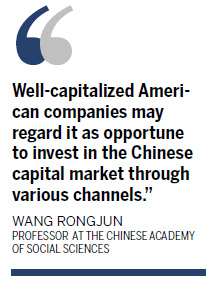US
Interest rate hike likely to spur US investment in China
By Lu Chang and Zhong Nan (China Daily)
Updated: 2010-10-21 10:44
 |
Large Medium Small |
BEIJING - The surprise interest rate hike on Tuesday will spur American investment in China, as investors in the United States capitalize on the interest gain and reduce local borrowing, economists said.
They also said the rate move will provide more leeway for Chinese policymakers to put a brake on the appreciation of the renminbi and protect the country's battered exporters.
"Speculation on interest gain from the renminbi will lure more hot money from US investors, who are keen to divert their money from the low-rate US dollar," said Feng Ke, director of Peking University's financial properties research center.
The central bank on Tuesday raised the benchmark one-year interest rate by 25 basis points, lifting the one-year deposit interest rate to 2.5 percent and lending rate to 5.56 percent. This compares to the nearly zero rate in major economies such as the US and Japan.
The move signals the start of a credit tightening cycle in China. At the same time, the possibility of the Federal Reserve Board increasing its interest rate is very low, analysts said. "This will result in a widening interest gap between the yuan and the greenback," said Wang Rongjun, a professor of economics at the Institute of American Studies of the Chinese Academy of Social Sciences.
"Well-capitalized American companies may regard it as opportune to invest in the Chinese capital market through various channels - for short-term, speculative gains," Wang said.

US investors can invest in China's B-share market - which is settled in US and Hong Kong dollars - and in the yuan-denominated A-share market through the qualified foreign institutional investor scheme.
After the rate hike, more US companies are likely to inject capital from headquarters to Chinese subsidiaries to avoid borrowing in China.
"American companies in China usually bring their own capital (from the US) and they don't borrow from Chinese banks," Wang said. "The rate hike, which adds to borrowing costs in China, will only consolidate this trend."
Inflows from the US, which is China's fifth largest investor, will also help boost the growth of foreign direct investment (FDI). China's inbound FDI, which excludes investment in the financial market, in September grew 6.14 percent to $8.38 billion from a year earlier, the second consecutive month of single-digit growth.
Some analysts said the interest rate hike could be a sign that the country might rein in the steady but gradual appreciation of the renminbi against the greenback.
"Hot money inflows will likely increase as investors seek higher yields, which could mean the central bank may actually reverse its policy of renminbi appreciation in the short term to deter speculative capital flows," said Oliver Barron, a financial analyst at China Economic Policy (London) Research Center. "The renminbi has appreciated around 2.6 percent against the US dollar so far this year against a likely year-end target of 3 percent, so it would not be unreasonable to see a short-term depreciation."
A rising currency and higher interest rates are among the most common financial tools to tame inflation - thus a rate increase means the central bank need not allow the currency to rise as quickly.
But Barron said long-term appreciation of the renminbi is in China's interest, as it would increase the purchasing power of Chinese individuals and increase real wealth.
The interest rate hike was announced two days before the release of third-quarter GDP growth figures and the September consumer price index on Thursday, which some analysts said could reach a 23-month peak of 3.6 percent. In August, the CPI rose 3.5 percent year-on-year.
China Daily
(China Daily 10/21/2010 page2)